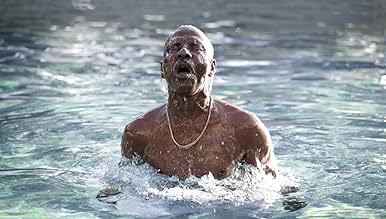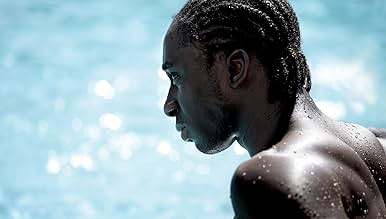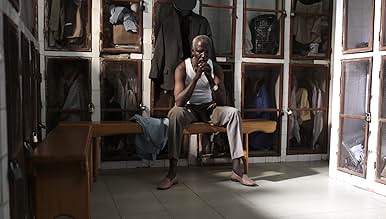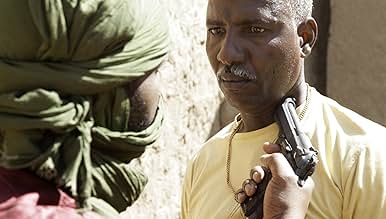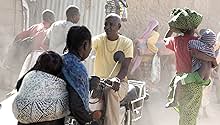Agrega una trama en tu idiomaPresent-day Chad. Adam, fifty-five, a former swimming champion, is pool attendant at a smart N'Djamena hotel. When the hotel gets taken over by new Chinese owners, he is forced to give up hi... Leer todoPresent-day Chad. Adam, fifty-five, a former swimming champion, is pool attendant at a smart N'Djamena hotel. When the hotel gets taken over by new Chinese owners, he is forced to give up his job to his son Abdel. Terribly resentful, he feels socially humiliated. The country is i... Leer todoPresent-day Chad. Adam, fifty-five, a former swimming champion, is pool attendant at a smart N'Djamena hotel. When the hotel gets taken over by new Chinese owners, he is forced to give up his job to his son Abdel. Terribly resentful, he feels socially humiliated. The country is in the throes of a civil war. Rebel forces are attacking the government. The authorities de... Leer todo
- Dirección
- Guionista
- Elenco
- Premios
- 8 premios ganados y 3 nominaciones en total
- Dirección
- Guionista
- Todo el elenco y el equipo
- Producción, taquilla y más en IMDbPro
Opiniones destacadas
Chadian filmmaker Mahamat-Saleh Haroun's fourth feature tells the story of Adam, or "The Champ" (Youssouf Djaoro) as he is also known, a former swimming champion in his mid- fifties, who works as a hotel pool attendant; a job in which he takes immense pride. Adam's closest colleague is his son Abdel (Dioucounda Koma), a twenty year old who documents every day of his life with his camera. Father and son make a harmonious pair and their family is a happy one, despite an intensifying civil war and the plans to privatise the hotel where they work. That is until the day the hotel management's cutbacks hit the family and Abdel is made pool attendant in his father's place. The looming threats of armed rebels approaching the city offers an unfortunate opportunity for Adam to restore himself, or at least that is what he, whose identity is intrinsically tied to his job and his past achievements, thinks.
A Screaming Man talks about loss of self, not as a consequence of happenings beyond our control, but of the choices we make when life throws us off guard. "Life continues", says David (Marius Yelolo), the hotel chef and Adam's close friend who is among the first to be affected by the down-sizings. Both men struggle to come to terms with the realisation that their passion and zest for life is of little value to anyone but themselves. The problem, David concludes, is that we put our destiny in God's hands – a God he still believes in but in whom he has lost faith – thus implying that there is room for human intervention regardless of the magnitude of the challenges we face. That it is in fact up to ourselves to decide what kind of person we want to be and how to express and live up to the decision once it has been made.
Adam's wife (Hadje Fatime N'Goua) scolds both her husband for having changed when he meets danger with passivity, and the invisible neighbour who thinks nothing of asking for favours without ever offering anything in return. She knows that there is pride in cooking, in singing, and in caring and providing for one's family. In having a purpose, and in trying to be the best one can be. And she knows that inherent in pride is the sense of dignity that helps us to treat others and ourselves with respect. Just before we lose ourselves we lose the little things; the subtle detail, the unsaid and the almost unnoticed, like the acts of saying "thank you" after supper. Haroun evokes the ordinary, not horror or deprivation, which he merely illustrates by the absence of what used to be. The civil war, like the rationalising process at the hotel, is but a backdrop and a circumstance; not a defining factor.
In his characteristic careful and understated manner Mahamat-Saleh Haroun shares the secret behind a decent life with an audience who has time for the mundane and the slow unfolding of seemingly undramatic events brimful with meaning. A secret spelled dignity and pride, be it that of a father, a professional, or a frightened man who has decided that his best years are behind him.
Talented South African filmmaker Khalo Matabane once tweeted "Great art speaks to the essence of what it is to be a human being; not only material and physical aspirations but existential too." A perfect description of A Screaming Man; a brilliant work of art in its own right, and in the way the film relates to its characters' ability and need for full self-expression through cooking, singing, swimming or tending to a pool.
This and other reviews available on the blog In The Words of Katarina (wordsofkatarina.blogspot.com)
Youssouf Djaoro portrays Adam Ousmane, who is called "Champion." When he was younger, he won the Central African swimming championship, and the name has stayed with him. His son, Abdel Ousmane (Diouc Koma) works with his father in a high-end hotel in the nation's capital. Both of them work at the hotel's swimming pool, where Adam is respected, and Abdel is adored by everyone because of his good looks and his easy-going manner.
This movie reminded me of a Greek tragedy. That's not because the father and son come into unwilling conflict, but because Adam has to make a choice between two terrible options. How can you do the right thing if either path you choose is the wrong path? When there are two compelling demands, and each precludes the other, what happens to the protagonist?
Adam is caught in just such a situation. There's a war going on, and the local political boss demands payment to the government. Adam, although not poor, doesn't have the money to make the payment. What are his options?
This movie is worth seeing on its own merits. That fact that it's from Chad makes it even more important to view it. If I counted correctly, less than a dozen films have been made in Chad. The superb Dryden Theatre at The Eastman Museum in Rochester is showing five of these movies as part of a Mahamat-Saleh Haroun retrospective. My compliments to the Dryden for giving us the opportunity to see these movies on the large screen. (Some of Haroun's films are available for the small screen, but some are not.) Seeing these movies on the large screen was truly a privilege. Un homme qui crie is a great film--see it if you can.
P.S. Even with the resources of the Eastman Museum, a print of Haroun's "Bye Bye Africa" couldn't be located. If you know someone who has a print of that movie, please notify the Dryden Theatre.
It's not every day that the star character is a 60 year old former national swimming champion, who's now more than happy - and resolutely proud - of his job as pool attendant at a posh, luxury hotel. But, as civil war slowly envelopes both the country and the film, it is Adam's (aka "The Champ") son, Abdel, who is causing turmoil for his father.
As it's noticed by the foreign hotel owner/managers that Adam is taking things more leisurely these days and he gets shuffled over to gate duty, dolled up in a starched uniform, his son gets his old job. This naturally causes ripples and resentment that go beyond the Hotel.
This beautifully shot movie from director Mahamat-Saleh Haroun is more observational than it is about making statements and stuffing opinion down on us. The story and the characters unfold naturally; we can take it at the steady pace that it is set and enjoy it as such. Or, you can really dig yourself deep within the different culture and attitudes to status, relationships, Imperialism and War and soak it all up. I hope to do the latter when I watch it again via the recording I made of it.
However, it is the final 15, 20 minutes that turn this drama into something much more profound and moving. I promise you, you will change your seated position, clear your throat and maybe inwardly murmur something to yourself as you sense a change of the overall stature is increased.
I'm not saying that A Screaming Man has to be seen by everybody or that it is the best Foreign language film of that year. It's different enough to get noticed, is topical without trying TOO hard and we are rewarded with a final chapter that is undoubtedly emotionally very moving. That's not a bad combination....
The movie is set in Chad. It appears to be sometime around the present day, though this is uncertain--as civil wars have been going on in the country off and on for decades and WHICH one this is isn't explained. This isn't really a problem--just go with it. The story centers around an older man nicknamed 'Champ', as he was a Central African swimming champion back in the 1960s. His job since has been to work as a pool attendant at a resort in his country. While to Westerners this might seem like a dull or unimportant job, it was everything to Champ--stability and a sense of importance. And when his boss began firing and rearranging things at the resort, Champ is panicked when they decide to have Champ's son take over the job alone (they'd both been working together) and move Champ to the job of gate keeper. What Champ does to cope with this is fascinating and makes for an interesting twist, but unfortunately though MOST of the film, Champ just keeps silent and broods. There is almost no visible emotion at all--just brooding and silence. And, after a while, the film gets VERY difficult to continue watching because of this. However, if you've invested this much time in the film, keep watching--the ending, though very sad, does tie everything together well. My overall verdict is that with more energy and life, this could have been an amazingly good film. Now, however, it's interesting to very patient folks only--which is sad, as we never get to see films about Chad and its people.
¿Sabías que…?
- TriviaThis film was importantly co-financed by the European Union through its EU-ACP Culture Plus Programme.
Selecciones populares
Detalles
- Fecha de lanzamiento
- Países de origen
- Idiomas
- También se conoce como
- A Screaming Man
- Locaciones de filmación
- L'Hotel de Meridien Chari, N'Djamena, Chad(The hotel)
- Productoras
- Ver más créditos de la compañía en IMDbPro
Taquilla
- Total en EE. UU. y Canadá
- USD 9,862
- Fin de semana de estreno en EE. UU. y Canadá
- USD 2,421
- 17 abr 2011
- Total a nivel mundial
- USD 193,981
- Tiempo de ejecución1 hora 32 minutos
- Color
- Mezcla de sonido
- Relación de aspecto
- 2.35 : 1
Contribuir a esta página


